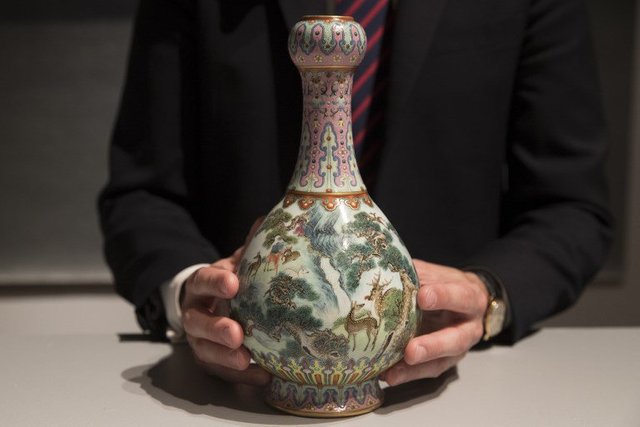
An 18th-century vase created for China's Qianlong Emperor and forgotten in an attic for decades, was sold Tuesday in Paris at an auction for 16.2 million euros ($ 19.1 million), a record for a porcelain Chinese in France.
The piece of exception was acquired after an arduous bid that lasted several minutes in a Sotheby's room among a small group of Chinese stakeholders, until one of them, young, who remained anonymous, prevailed.
The sale constitutes an "absolute record for a work sold in Sotheby's Paris since the opening of the market to foreign auction houses" in 2001, according to the auction house.
Estimated before the auction between 500,000 and 700,000 euros, the vase is in perfect condition and presents polychrome details, among which dominate the pink tones. It is decorated with a landscape populated by deer and cranes surrounded by pine trees. Under the base, there is a "mark of the kingdom" of six characters.
"This vase is the only one known in the world with this type of detail. It is a major work of art, as if we were discovering a Caravaggio ", according to Olivier Valmier, curator specializing in Asian art.
The masterpiece was found in the attic of a family farmhouse, where it remained for decades, among other Chinese pieces. "We do not like this vase very much and my grandparents did not like it either. Their colors are too bright, "explained the owner. Three months ago, he contacted Sotheby's, where the object arrived in a simple shoebox.
It would have been acquired in France at the end of the 19th century. Inside a Japanese perfumer also preserved in the attic, was found an invoice that dates back to the Universal Exhibition of 1867.
Only four vases called "yancai ruyi", with this type of idyllic landscape, have been documented in the production of Jingdezhen's imperial workshops.
In 1765, two were assigned to the Buddha Pavilions in the private apartments of Qianlong. In 1769, many others were commissioned as an anniversary gift for the emperor. An object of similar shape and style, but without cranes, is preserved in the Guimet museum in Paris.
- A free drawing -
Although it is a very free drawing, the landscape is not imaginary, since it is inspired by the Imperial Hunting Park of Mulanj, one of the summer residences where the emperor was installed during the hottest seasons.
The animals and plants represented are loaded with symbols: the fallow deer is synonymous with happiness and prosperity; the cranes - the immortals of the immortals in the air - personify old age; the green pine represents eternal life and the lingzhi, a fungus, immortality.
The imperial pieces of the Qianlong period (1735-1796) are especially sought after.
An imperial seal dating from that time set a world record when sold for 21 million euros in December 2016 in Paris.
Congratulations! This post has been upvoted from the communal account, @minnowsupport, by tattooemp from the Minnow Support Project. It's a witness project run by aggroed, ausbitbank, teamsteem, theprophet0, someguy123, neoxian, followbtcnews, and netuoso. The goal is to help Steemit grow by supporting Minnows. Please find us at the Peace, Abundance, and Liberty Network (PALnet) Discord Channel. It's a completely public and open space to all members of the Steemit community who voluntarily choose to be there.
If you would like to delegate to the Minnow Support Project you can do so by clicking on the following links: 50SP, 100SP, 250SP, 500SP, 1000SP, 5000SP.
Be sure to leave at least 50SP undelegated on your account.
Downvoting a post can decrease pending rewards and make it less visible. Common reasons:
Submit